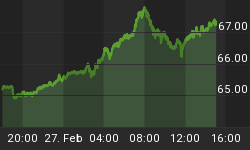China is hurting. The entire global economy has taken a huge hit from the spread of the coronavirus, but so far none have been hit as hard as China, where the COVID-19 pandemic originated. The world’s second-largest economy came to a grinding halt back in January, leading to a historic economic slump for the nation that has seen nothing but growth in recent years.
Last month Business Day reported that “China suffered an even deeper slump than analysts feared at the start of the year” as “industrial output plunged 13.5% in January and February from a year earlier, retail sales fell 20.5%, and fixed-asset investment dropped 24.5%. The unemployment rate jumped to a record 6.2% in February, when the outbreak worsened and much of the economy was shut down.”
That has major implications for all of us. “China Stopped Its Economy to Tackle Coronavirus. Now the World Suffers,” proclaimed a New York Times headline early last month. “If the coronavirus plunges the world into recession, China will be the biggest reason,” the article reads. To make matters worse, for many economists, the looming recession seems to be a matter of when, not if. “Economists caution that [China’s] shutdown threatens the economies of Japan, South Korea, Europe and even the United States. Huge corporations like Apple, Microsoft, AB InBev and Pfizer have already seen an impact,” and “even those warnings understate China’s reach.”
The oil industry is no exception. As China’s economy halted and the coronavirus continued to spread, oil demand plummeted. This led to a disagreement between the OPEC+ members of Saudi Arabia and Russia, which resulted in a broken alliance and then an all-out oil price war. Now. we’re suffering from one of the biggest oil price crashes in history, the Permian Basin is being rocked by tens of thousands of layoffs, and the first major United States shale company has already succumbed to the crisis and declared bankruptcy this week. And that company, Whiting Petroleum, “is just the ‘first domino’ to fall in US shale wipeout,” according to CNBC.
And now, with crude oil prices through the floor, the Chinese economy has emerged from its slumber to buy it all up. “China is moving forward with plans to buy up oil for its emergency reserves after an epic price crash,” Bloomberg reported this week. “The world’s biggest importer is taking advantage of a 60 percent plunge this year to snatch up cheaper barrels for its stockpiles, a source of considerable speculation in the oil market because of the government’s reluctance to release information about their formation, size or use.”
The country intends to buy up so much crude oil in the coming weeks that they won’t have enough state-owned storage to hold it all. According to interviews with industry insiders who asked Bloomberg to maintain their anonymity, Beijing has plans to use commercial storage space as well, while also reaching out to the private sector to encourage them to fill their own tanks with cheap gas as part of a nationwide contingency plan.
“The initial target is to hold government stockpiles equivalent to 90 days of net imports, which could eventually be expanded to as much as 180 days when including commercial reserves,” the Bloomberg report continues. “Ninety days of net crude imports is about 900 million barrels [...]. While the current size of China’s state reserves is unknown, and Beijing could use a different method for calculating net imports, oil traders and analysts estimated it could amount to China buying an additional 80 million to 100 million barrels over the course of the year.”
This could be great news for the global oil market, which desperately needs to sell off some of the glut that brought oil prices so low in the first place, but likely will not make enough of a dent to correct the problem any time soon.
By Haley Zaremba for Oilprice.com
More Top Reads From Safehaven.com:
















